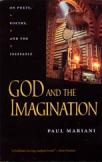The Divine Shines Through
The title is brave: God and the Imagination. The book is even braver, for in 22 essays the prizewinning biographer and poet Paul Mariani probes himself, modern American poetry and the poetic imagination. His goal is to link together the making of a poem, the worldview of a poet and the shining of God through literature and language.
The recurring word psychogenesis offers a key to Mariani’s perspective. For him, a poem’s psychogenesis involves at once “the poet’s concerns, obsessions, [and] self-directives,” the poet’s “world” and influences, the “complex linguistic strands that make up the self of the poet” and the “electric moment” of inspiration. A deep sense of the human and the inspiration of a Christian humanism underlie Mariani’s own worldview. For him, poems—despite current tastes in literary criticism—are not cold collections of words but human artworks that emerge from living poets with living value systems. In his essays and biographies he links “the world of the poem and the world of the poet,” to recreate “the poetic/spiritual journey the poet traversed.” He goes on to seek the incarnational shining of the divine both in Catholic poets like Gerard Manley Hopkins and Thomas Merton and in questing, secular writers like Walt Whitman, William Carlos Williams and Wallace Stevens.
In the first part of God and the Imagination, Mariani probes himself: youth and college in New York City, working-class roots, Catholicism and a fall into love of poetry and language. Hopkins becomes his “lifeline” as he goes on to marry and have children, teach in upstate New York, do a Ph.D. at CUNY, become professor at the University of Massachusetts, Amherst, then hold a chair at Boston College. His memories are vivid, physical, specific: “cream-colored classrooms,” “a pretty cheerleader in ponytail,” “pumping gas and cleaning toilets at Scotty’s Esso and the Sinclair station across from the Nassau County courthouse in Mineola.” Such memories engender his poems’ “magic kingdom of language” and his biographies’ “dialogues with the dead,” as he becomes “a priest of the imagination.”
Mariani then studies the four modern American poets he most admires and whose biographies he has written: Robert Lowell, William Carlos Williams, Hart Crane and John Berryman. Other essays consider other favorites: pre-eminently Gerard Manley Hopkins, but also Walt Whitman, Galway Kinnell, Robert Pack, Thomas Hardy, Robert Frost and Wallace Stevens. Recurring themes include the poet behind the poem, the mystery of poetic creativity, the importance of language (“an order out of words”), poetry’s ability to transform the quotidian, the imagination as a response to death and the role of biography. Noting Stevens’s comment that “one of the visible movements of the modern imagination is the movement away from God,” Mariani urges its corollary: “the invisible movements of the modern imagination...toward that same God.” Hence Mariani’s chosen task: “to track the elusive flame within the pitchblende of this odd, arrogant, vital century” until “something authentic begins to glimmer in the dark.”
The book’s third part more explicitly reflects on God and the imagination. Since Mariani’s argument comes in parts, one summary might go this way. Language both interiorizes the writer and expresses the writer’s self; the artist is “the reinventer, the remaker, of the language.” But today’s language of religious poetry no longer can effectively express religious content; language—both in theology and in common usage—is emptied of its former significance. It must be reconstituted so as to be sacramental; it must pay “homage to the splendid grittiness of the physical as well as to the splendor and consolation of the spiritual.” As with William Carlos Williams, “it’s not the lack of belief that rendered the poet largely silent on the score of religion, but rather the absence of a language adequate to manifesting the realities of the spiritual.”
As for the imagination, Keats displaced philosophy and theology as “world orderers” in favor of the imagination and the self. Yet if, as Wallace Stevens wrote, “we say God and the imagination are one,” and if, as William Lynch, S.J., wrote, the Incarnation has turned “the whole order of the old imagination” on its head, God must be permitted to re-enter the imagination. We need fresh language and a reintegrated imagination. Thus, Whitman, Williams and Stevens are “incarnational” in poems “filled with things of this world” yet “proclaiming the splendid misery of things.” Yet Hopkins, Merton, Richard Wilbur and (in fiction) Flannery O’Connor and Andre Dubus do more, making manifest “a sense of the abiding presence of God in the things of the world.” All eight writers raise “the quotidian to the level of spirit.”
So does Mariani, in both language and imagination, as he quotes his Christmas poem about the shepherds: “For chrissake think about it: here it is/ the middle of the night & these poor bastards/ freezin’....” The rest is similarly frank, language-fresh and incarnational. In this poem Christ-God really is visited by earthy, uncouth shepherds. The divine really does shine through the quotidian. God and the imagination really are connected.
In God and the Imagination, Mariani is most original in his comments on a poem’s psychogenesis and on language, rather than content, as a locus of the religious imagination. On the latter, liturgists, theologians and bishops might well take heed. But to return to language: this is the book of a poet, stylist and word-lover who is also a clear thinker, an acute stylist and a compelling enthusiast.
This article also appeared in print, under the headline “The Divine Shines Through,” in the January 6, 2003, issue.








